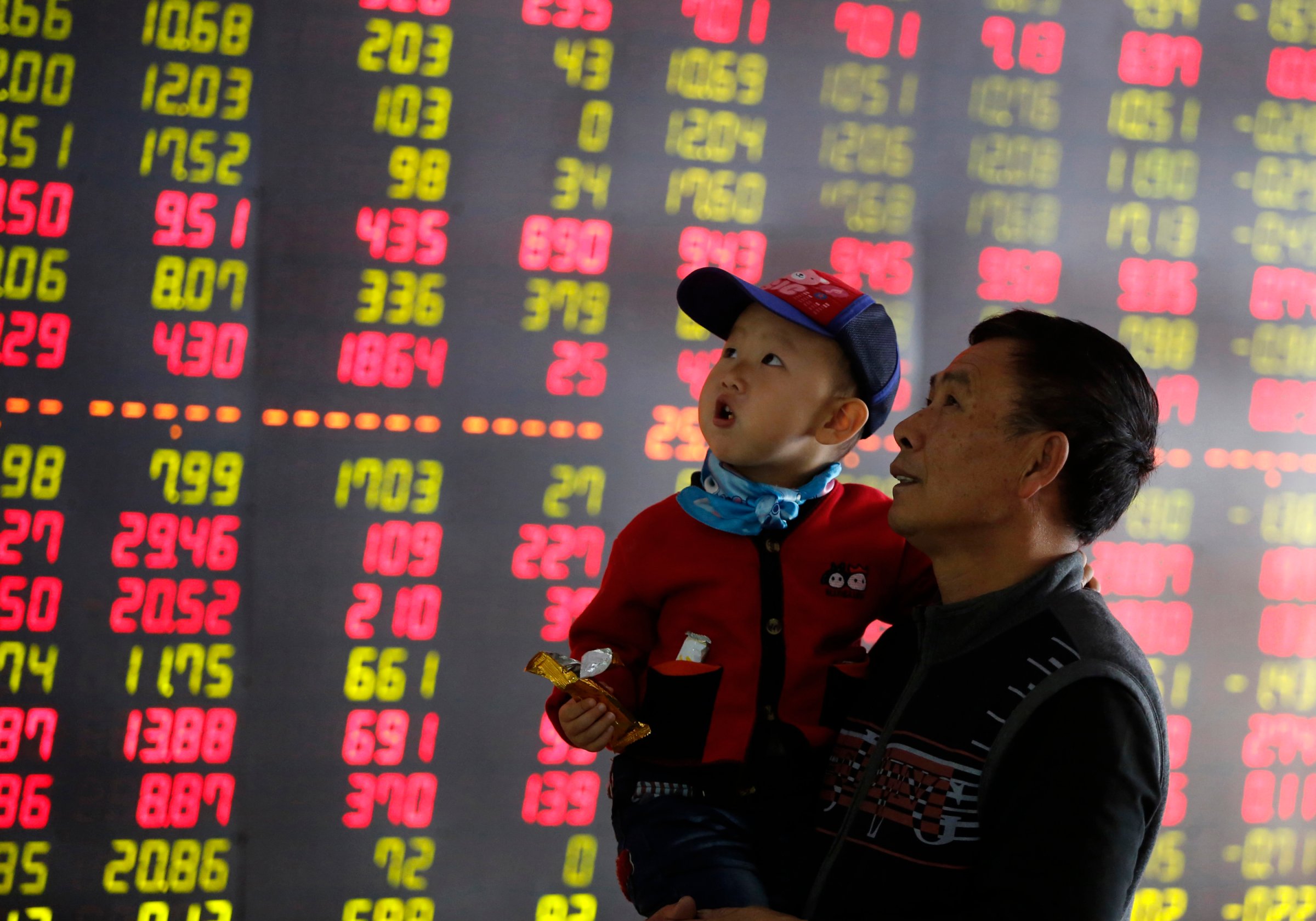
Stock markets are supposed to be indicators of where economies are headed. The recent sell-off in global equities, however, shows investors are just catching up with the headlines. Wall Street had powered through the gloomy news emanating from much of the global economy for most of the year, with indices scoring one record after the next. But now investors seem to have finally woken up to the world’s woes, causing the bulls to stampede. On Wednesday, the Dow Jones Industrial Average plunged by as much as 2.8%, and even though it later recovered, it has still fallen by 5% in five days. That followed a terrible day on European bourses, with the German and French markets suffering large losses. The trouble continued Thursday in Asia, with losses in Tokyo and Hong Kong.
Financial markets are reacting to what should have been obvious to investors for some time — growth is stumbling in just about every corner of the planet. And we can blame some pretty gutless policymaking for it. From Beijing to Brussels to Brasilia, governments are failing to implement the reforms we need to finally lift the global economy out of the protracted slump tipped off by the 2008 financial crisis.
The situation is most infuriating in Europe. The International Monetary Fund recently cut its forecast for euro zone GDP growth to a mere 0.8% this year. Germany, the largest and supposedly strongest economy in the zone, is projected to expand only 1.4%, while Italy, the zone’s third-largest economy, will likely contract again in 2014. Unemployment remains stubbornly high at 11.5%. Meanwhile, the leaders of Europe seem unconcerned and have done little to encourage growth or job creation. At a European level, the process of forging greater integration and bringing down remaining barriers to cross-border business has stalled, while the record of individual governments in liberalizing markets and fixing broken labor systems is at best mixed. Mario Draghi, the president of the European Central Bank, has fallen behind the curve in preventing prices from falling to dangerously low levels, raising fears of deflation, which would suppress consumption and investment even further. No wonder more analysts are worried Europe is facing “Japanification” — a potentially destructive, long-term malaise similar to what has been experienced in Japan.
Speaking of Japan, the program of Prime Minister Shinzo Abe — dubbed “Abenomics” — is being exposed as a failure. Massive monetary stimulus from the Bank of Japan has not jumpstarted growth, while Abe, with government finances increasingly under strain, has had to hike taxes, dampening consumption and denting growth even further. The promised structural reforms that could raise the economy’s potential, from loosening up labor markets to opening protected sectors, have barely gotten off the ground. The IMF sees Japan’s GDP expanding a meager 0.9% in 2014.
The story in emerging markets isn’t much better. Once high fliers have crashed down to earth. Brazil’s economy will likely grow a pathetic 0.3% this year, while Russia, plagued by sanctions, will be lucky to avoid a recession. Even China is struggling. Though growth remains above 7% — at least officially — economists are just now starting to realize such rates are probably the country’s “new normal.” Facing a property slump and excessive debt, the economy will continue to slow down in coming years. Beijing’s policymakers have promised a lot of the liberalizing reforms that could fix China’s growth model, but they have implemented almost none of that program. A free-trade zone that was to be a critical experiment in more open capital flows, launched with great fanfare in Shanghai a year ago, has languished as policymakers drag their feet on implementation.
There are occasional bright spots, though. It looks like India is rebounding, while growth in some other developing nations, such as the Philippines, remains healthy. But that won’t be enough to stir prospects globally. And while the U.S. is better off than most other advanced economies, the inability of Washington to confront problems like income inequality or sagging infrastructure is holding the economy back.
What we are witnessing around the world is a slowdown created to a large degree by bad policymaking and political inaction. In fact, you could make the argument that what steps have been taken have only made matters worse. The long-running easy money policies of the Federal Reserve probably helped to propel the prices of stocks and other assets upward, detaching them from the underlying fundamentals of the global economy and making them vulnerable to sudden shocks and shifts in sentiment.
Perhaps what we’re seeing in global stock markets is a temporary correction or short-term adjustment. Or perhaps markets are telling us things will be much worse than we expect in coming quarters. Either way, it seems like investors are finally swallowing a dose of economic reality.
More Must-Reads from TIME
- Donald Trump Is TIME's 2024 Person of the Year
- Why We Chose Trump as Person of the Year
- Is Intermittent Fasting Good or Bad for You?
- The 100 Must-Read Books of 2024
- The 20 Best Christmas TV Episodes
- Column: If Optimism Feels Ridiculous Now, Try Hope
- The Future of Climate Action Is Trade Policy
- Merle Bombardieri Is Helping People Make the Baby Decision
Contact us at letters@time.com